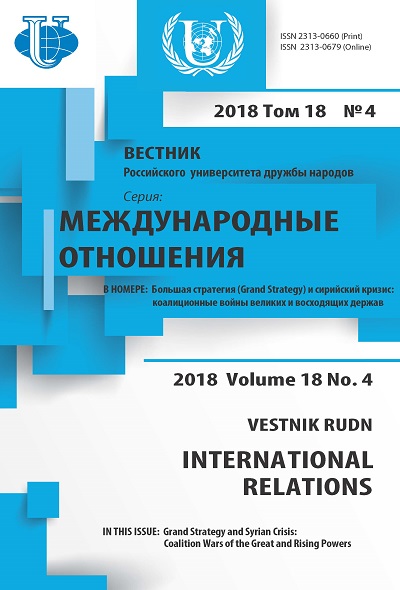«Сирийская проблема» в турецко-американских отношениях
- Авторы: Алиева А.И.1
-
Учреждения:
- Московский государственный университет имени М.В. Ломоносова
- Выпуск: Том 18, № 4 (2018): Большая стратегия (Grand Strategy) и сирийский кризис: коалиционные войны великих и восходящих держав
- Страницы: 790-805
- Раздел: ТЕМАТИЧЕСКОЕ ДОСЬЕ
- URL: https://journals.rudn.ru/international-relations/article/view/20324
- DOI: https://doi.org/10.22363/2313-0660-2018-18-4-790-805
- ID: 20324
Цитировать
Полный текст
Аннотация
С начала гражданской войны на территории Сирийской Арабской Республики (САР) Соединенные Штаты Америки и Турецкая Республика выступили активными сторонниками смены правительства и отставки президента Б. Асада. Поиски путей политического урегулирования «сирийской проблемы» открыли широкие возможности для турецко-американского взаимодействия. В статье рассматриваются наиболее важные направления двустороннего взаимодействия и предпринимается попытка объяснить усиление американо-турецких противоречий на фоне событий последних лет в Сирии. Двухчастная структура статьи отражает логику развития взаимоотношений Турецкой Республики и Соединенных Штатов Америки в условиях стремительного изменения расстановки сил в Сирии и регионе, и в этом развитии четко прослеживаются два этапа. Имевшее место на ранних этапах сирийского конфликта в 2011-2013 гг. американо-турецкое сотрудничество, включавшее в том числе и совместную работу по укреплению боевого потенциала сирийской оппозиции, к 2014 г. сменилось соперничеством этих государств за влияние на территории Сирийской Арабской Республики. Основной причиной углубления разногласий между союзниками выступил «курдский вопрос», который во многом стал определять линию поведения Анкары и Вашингтона в отношении участников конфликта в Сирии. Развертывание борьбы с терроризмом в САР выявило глубокие различия в подходах турецкого и американского правительств по отношению к ключевым участникам сирийского конфликта. Автор приходит к выводу, что сегодня США и Турция действуют на сирийском направлении, исходя из безусловной приоритетности собственных национальных интересов, а не связывающих их формальных союзнических обязательств. При этом вопрос отстранения от власти в Сирии Б. Асада и для Вашингтона, и для Анкары отошел на второй план, уступив место борьбе с вызовами национальной безопасности в лице экстремистских и террористических организаций типа «Исламского государства»1.
Ключевые слова
Об авторах
Алтунай Илгар кызы Алиева
Московский государственный университет имени М.В. Ломоносова
Автор, ответственный за переписку.
Email: alieva_altunay@mail.ru
младший научный сотрудник факультета мировой политики МГУ имени М.В. Ломоносова, сотрудник Центра проблем безопасности и развития факультета мировой политики МГУ
Список литературы
- Иванова И.И. Эволюция ближневосточной политики Турецкой Республики (1923-2016). М.: Аспект-Пресс, 2017
- Свистунова И.А. Турция и сирийский кризис: вызовы и возможности для внешней политике Анкары // Проблемы национальной стратегии. 2018. № 1(46). С. 74-96
- Abramowitz M.I., Edelman E.S. U.S.-Turkish Cooperation toward a Post-Assad Syria // Bipartisan Policy Center. 2013. April
- Akcan M. Türk dış politikasında “Davutoğlu etkisi” ve Suriye krizi // Toplumcu Düşünce Enstitüsü [Turkish Foreign Policy of “Davutoğlu effect” and Syrian Crisis. Socialist Thought Institute]. 2018. 23 Mayıs. (на тур. яз.)
- Aktürk Ş. Turkey’s Role in the Arab Spring and the Syrian Conflict // Turkish Policy Quarterly. 2017. Vol. 15. No. 4. P. 87-96
- Arı T. Yükselen güç. Türkiye-ABD ilişkileri ve Orta Doğu [Rising power. Turkey-US Relations and the Middle East]. Bursa: Marmar Kitap Merkezi, 2010. (на тур. яз.)
- Balcı A. Türkiye dış politikası. Ülkeler, aktörler, uygulamalar [Turkey’s Foreign Policy. Countries, Actors, Applications]. İstanbul: Etkileşim, 2013. (на тур. яз.)
- Barkey H.J. Syria’s Dark Shadow over US-Turkey Relations // Turkish Policy Quarterly. 2016. Vol. 14. No 4. P. 25-36
- Çandar C. Dağdan iniş - PKK nasıl silah bırakır? // TESEV Yayınları [Descent from the Mountain: How Does the PKK Lay Down Arms? // TESEV Publications]. 2011. Temmuz. İstanbul. S. 1-103. (на тур. яз.)
- Cankurtaran Sunar B., Gençkaya F.Y. Surı̇ ye krı̇ zı̇ bağlaminda Obama dönemı̇ Türkı̇ ye-ABD ı̇ lı̇ şkı̇ lerı̇ nde değı̇ şen güvenlı̇ k ortakliği [Obama Term Turkey-US Relations and Changing Security Partnership in The Context of Syria Crisis] // International Journal of Academic Value Studies. 2017. Vol. 3. No. 11. P. 141-150. DOI: 0.23929/javs.216 (на тур. яз.)
- D’Alema F. The evolution of Turkey’ Syria policy // IAI Working Papers. 2017. October. 17/28. P. 1-18
- Davutoğlu A. 2014 yılına girerken dış politikamız // Dışişleri Bakanlığı [Foreign Policy in 2014 // Ministry of Foreign Affairs]. 2013. Ankara. (на тур. яз.)
- Kanat K., Üstün K. US-Turkey Realignment on Syria // Middle East Policy. 2015. Vol. 22. No 4. Winter. P. 88-97
- Kanat K., Üstün K. US-Turkish Relations: in Search of a New Paradigm // Mediterranean Quarterly. 2013. Vol. 24. No 4. P. 82-91
- Okyay A. Turkey’s post-2011 Approach to its Syrian Border and its Implications for Domestic Politics // International Affairs. 2017. Vol. 93. No 4. P. 829-846. doi: 10.1093/ia/iix068
- Suriye’de güvenli bölge tartışmaları: Türkiye açısından riskler, fırsatlar ve senaryolar [Safe zone regional debates in Syria: risks, oportunities and scenarios for Turkey] // ORSAM. 2012. Rapor No: 115. Nisan. (на тур. яз.)
- Thomas C., Zanotti J. Turkey: Background and U.S. Relations // CRS Report. August 31, 2018
- Turkey - USA Partnership at the Dawn of a New Century // Global Relations Forum. Task Force Report. Istanbul, 2011
- Yakış Y. Turkey after the Arab Spring: Policy Dilemmas // Middle East Policy. 2014. Vol. 21. No 1. Spring. P. 98-106. doi: 10.1111/mepo.12060
- Zanotti J. Turkey after June 2015 Elections: Erdogan and the AKP Fall Short // CRS Insights. 16.06.2015. URL: https://fas.org/sgp/crs/mideast/IN10292.pdf (accessed: 30.08.2018)
- Zanotti J. Turkey-U.S. Cooperation Against the “Islamic State”: A Unique Dynamic? // CRS Insights. 21.10.2014. URL: https://fas.org/sgp/crs/mideast/IN10164.pdf (accessed: 30.08.2018)
Дополнительные файлы










